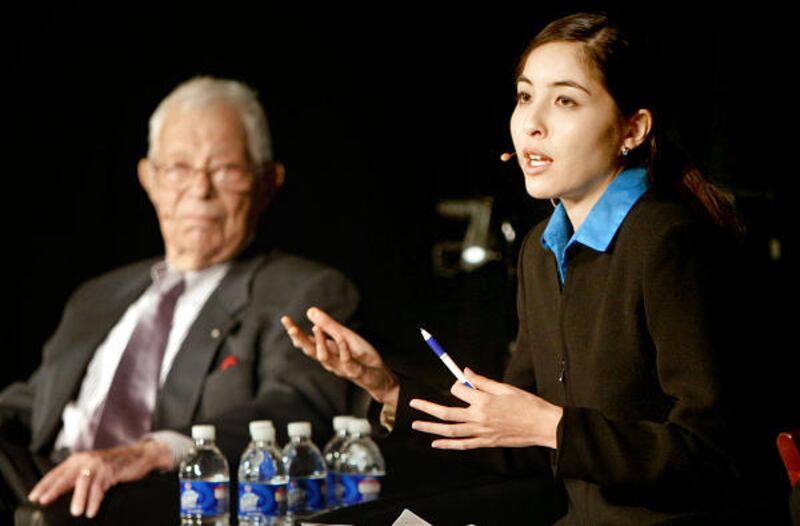Addressing a packed room of several hundred people, freed Iranian-American journalist Roxana Saberi, along with National Public Radio senior news analyst Daniel Schorr, spoke on the importance of freedom of the press Saturday.
"Journalism is not without its risks," Schorr said, adding many journalists were arrested in Iran after the June election, and 20 were recently slain in Russia.
Saturday's event at Rowland Hall in Salt Lake City was sponsored by the McCarthey Family Foundation. It was the Fourth Annual Lecture Series: "In Praise of Independent Journalism."
Saberi, who was working as a freelance journalist in Tehran, contributing to NPR and BBC, was taken from her apartment by four men one morning in January 2009 and placed in solitary confinement. There she was falsely accused of spying for the United States and sentenced to eight years in prison.
Saberi, who grew up in Fargo, N.D. and is a former Miss North Dakota, was held captive for 100 days before an appeals court released her following an international uproar.
Saberi said she always wanted to report overseas. Her father is Iranian and her mother is Japanese. She wanted to practice her Farsi and work as a journalist in Iran.
During her time as a reporter, different censorship incidents occurred, including her being blocked from entering a parliament meeting because she is a woman — although there are female parliament members. "I was shocked," Saberi said.
While she was covering university student protests in the streets in 2003, plainclothes vigilantes confiscated her tapes. The next day police took her camera. A few days later her press pass was temporarily revoked because her footage of the street protests was deemed "too violent."
That was nothing compared to how the Iranian press itself was censored, she said.
Newspapers were shut down. Government instructed the media how to cover the news, for example, ordering them not to cause fear or worry, she said. And stories were censored before they were published.
There is a battle against "dangerous Western thoughts," Saberi said.
Many Iranian journalists are leaving the profession. "Some would rather write nothing instead of censor themselves," Saberi said. Other Iranian reporters write Web blogs or contribute to foreign Web sites.
Saberi's press pass was permanently revoked in 2006. She was still able to do some reporting without it — she just wasn't allowed into government meetings. She was writing a book on Iran when she was abducted.
"I hope you will value the freedoms you have," Saberi said. "I didn't realize the value of freedom until I was deprived of it."
Veteran reporter and commentator Schorr, 93, interprets national and international events as senior news analyst for NPR. He began as a foreign correspondent in 1946 and switched to American issues in 1966.
His career has earned him many awards, including three Emmys for his Watergate coverage.
During his coverage of the Senate Watergate hearings, he unexpectedly discovered, as he read the list live on camera, he was No. 17 on the Nixon enemy list.
"A journalist is not always safe," Schorr said.
He was suspended from CBS and investigated by the House Ethics Committee, during which time he was threatened with jail for contempt of Congress if he did not disclose his source. He refused, citing the First Amendment.
"We have to fight government censorship," Schorr said.
Suzanne Store, 61, a ceramic artist who lives in Ogden, said she attended Saturday's event because she has been a fan of Schorr for a long time.
"He seems to be the most credible journalist around, and I respect his perspective and integrity," Store said. "He seems to truly state it like it is."
e-mail: astewart@desnews.com

